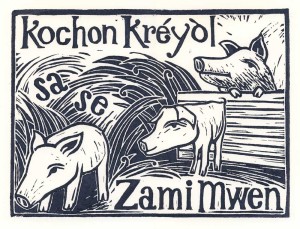This is a quote from Jean-Bertrand Aristide’s book, Eyes of the Heart, as quoted by k gallagher, who was in turn quoting Sabina England. I’d been meaning to repost this for some time, but some re-posting on the C4SS listserv reminded me of it to-day.

The history of the eradication of the Haitian Creole pig population in the 1980s is a classic parable of globalization. Haiti's small, black, Creole pigs were at the heart of the peasant economy. An extremely hearty breed, well adapted to Haiti's climate and conditions, they ate readily-available waste products, and could survive for three days without food. Eighty to 85% of rural households raised pigs; they played a key role in maintaining the fertility of the soil and constituted the primary savings bank of the peasant population. Traditionally a pig was sold to pay for emergencies and special occasions (funerals, marriages, baptisms, illnesses and, critically, to pay school fees and buy books for the children when school opened each year in October).
In 1982 international agencies assured Haiti's peasants their pigs were sick and had to be killed (so that the illness would not spread to countries to the North).[] Promises were made that better pigs would replace sick pigs. With an efficiency not since seen among development projects, all of the Creole pigs were killed over a period of thirteen months.
Two years later the new, better pigs came from Iowa. They were so much better that they required clean drinking water (unavailable to 80% of the Haitian population), imported feed (costing $90 a year when the per capita income was about $130), and special roofed pigpens. Haitian peasants quickly dubbed them prince a quatre pieds,
(four-footed princes). Adding insult to injury, the meat did not taste as good. Needless to say, the repopulation program was a complete failure. One observer of the process estimated that in monetary terms peasants lost $600 million dollars. There was a 30% drop in enrollment in rural schools, there was a dramatic decline in protein consumption in rural Haiti, a devastating decapitalization of the peasant economy and an incalculable negative impact on Haiti's soil and agricultural productivity. The Haitian peasantry has not recovered to this day.
Most of rural Haïti is still isolated from global markets, so for many peasants the extermination of the Creole pigs was their first experience of globalization.
–Jean-Bertrand Aristide, Eyes of the Heart: Seeking a Path for the Poor in the Age of Globalization (Common Courage Press, 2000). 13-15.
This insanely destructive scorched-earth massacre of indigenous pigs — carried out by an alliance of multi-national inter-government agencies, and followed by a reconstruction project that amounted to a context-ignorant, centrally-directed forced march towards neoliberal modernization — is a near-perfect illustration of colonialist logic and its real-world effects. The results were a massive ratcheting up of the fixed costs of living for peasants; the violent destruction of locally-based, resilient sources of capital; a massive subsidized transfer of capital and trade into the hands of corporate managers; and the attempted, government-driven remaking of an agricultural economy along lines dictated by the business models of the Metropole. The ruling elite in the U.S., their allies in the international development
racket and in the ruling elite of the government that controlled Haiti destroyed local economies, forcibly remade markets in their preferred image, and then called the results progress
and integration into global markets.
It is of course globalization of a sort — the sort practiced by Alexander or Caesar or Genghis Khan. Whether or not it has anything to do with markets,
depends on what it is you think that you are defending, or criticizing, when you talk about markets.
If self-organizing markets are going to be worth anything at all, they have to mean more than a cash-nexus yoked to human relations by any means necessary and kept on there no matter the cost to the people’s livelihoods or to the lives of people, animals and the earth. Where markets are valuable, they are valuable precisely because of basic respect for human-scale ownership and evolving patterns of trade, and the people-powered, decentralized, informal and adaptable sorts of relationships like those that emerged around raising and keeping creole pigs — not because of engineered commerce, or the formalized, centralized, high-overhead, government-driven models of industrial agribusiness hog-production.
And if you think colonialism, neoliberalism and forced modernization are only about what happens outside the borders of the U.S., think again. This parable has wings, and colonial reconstruction knows no borders. It’s not the first time that the U.S. government has massacred pigs as a matter of policy; and it applies to lots of other kinds of small-scale personal capital and localized markets, in the internal as well as the external projects of colonizing governments. See, for example, Scratching By, Enclosure Comes to Los Angeles, 1, 2, 3, 4, 5, 6, 7, 8, 9, etc. etc. etc.
Also.


